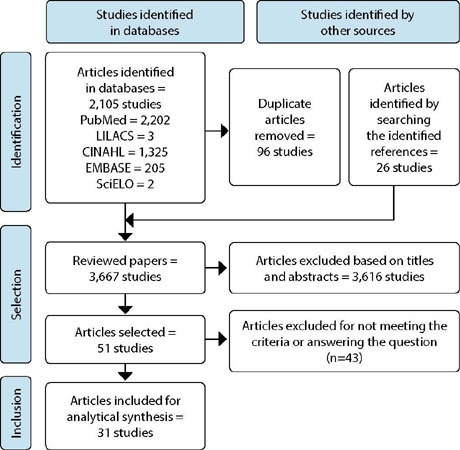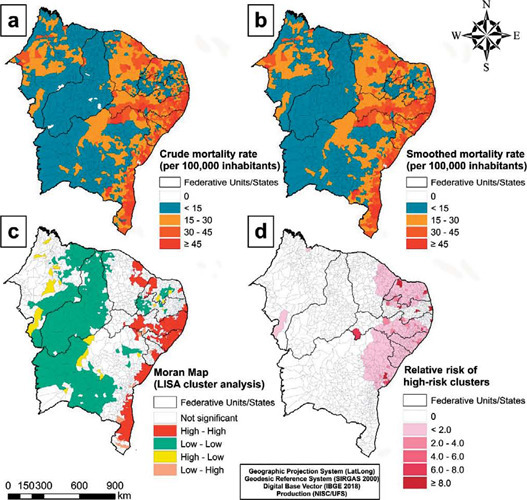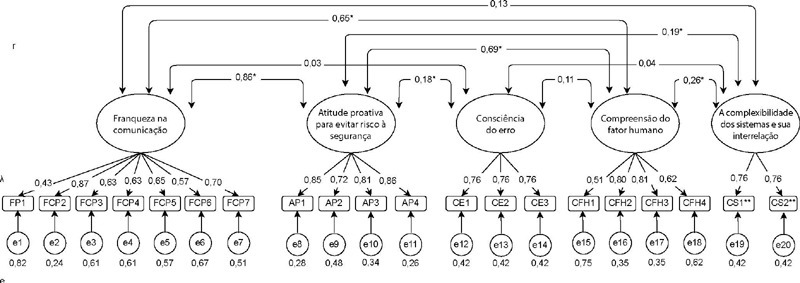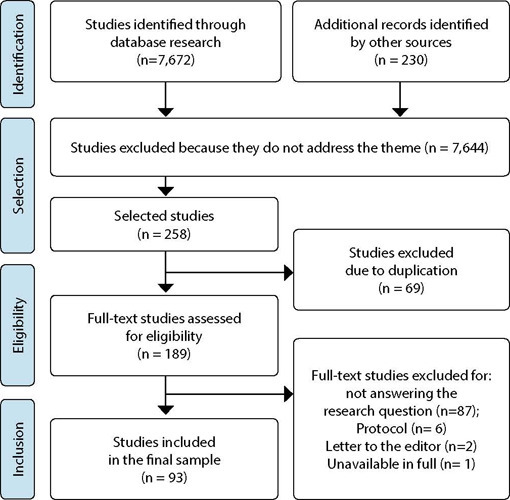-
02-06-2023
The challenge of university teaching in times of the COVID-19 pandemic
Revista Brasileira de Enfermagem. 2023;76(2):e760201
Abstract
The challenge of university teaching in times of the COVID-19 pandemic
Revista Brasileira de Enfermagem. 2023;76(2):e760201
DOI 10.1590/0034-7167.2023760201
Views0This planet’s history has been a long and sometimes tortuous one. To date, a total of five disappearances of life on Earth have been distinguished: the great oxidation; the Ordovician-Silurian extinction; the Devonian extinction; the Permian-Triassic extinction; the Triassic-Jurassic extinction; and the Cretaceous-Tertiary extinction. The causes? Very varied and diverse: anoxia phenomena in the marine […]See more -
ORIGINAL ARTICLE02-06-2023
Nurses’ Work Methods Assessment Scale: a study of content validation
Revista Brasileira de Enfermagem. 2023;76(2):e20220396
Abstract
ORIGINAL ARTICLENurses’ Work Methods Assessment Scale: a study of content validation
Revista Brasileira de Enfermagem. 2023;76(2):e20220396
DOI 10.1590/0034-7167-2022-0396
Views0See moreABSTRACT
Objective:
To develop and validate the content of the Nurses’ Work Methods Assessment Scale.
Methods:
Methodological study conducted between January and February 2022, based on the Quality Standards for Nursing Care and Imogene King’s framework. A literature review was previously undertaken to design the scale. The content validation was carried out by 23 experts.
Results:
The initial version consisted of 40 items organized in four work methods identified in the literature. In the first dimension, from ten items, seven were considered, and one was reformulated. Seven of the initial ten items were considered in the second version. The third dimension consisted of seven items. In the fourth dimension, three items were reformulated, and three were excluded, leaving seven items. The final version ended with 28 items, whose Content Validity Index ranged between 0.83 and 1.
Conclusions:
The involvement of experts has become pivotal in the development and validation of the items, providing confidence to the continuity of psychometric procedures.
-
REVIEW02-06-2023
Decreased cardiac output: an integrative review
Revista Brasileira de Enfermagem. 2023;76(2):e20220265
Abstract
REVIEWDecreased cardiac output: an integrative review
Revista Brasileira de Enfermagem. 2023;76(2):e20220265
DOI 10.1590/0034-7167-2022-0265
Views0See moreABSTRACT
Objective:
to identify, in the scientific literature, the defining characteristics and contributing factors (related factors, associated conditions and populations at risk) for nursing diagnosis decreased cardiac output.
Method:
an integrative literature review, conducted between September and October 2020, with an update in March 2022, in the MEDLINE via PubMed, LILACS, SciELO, CINAHL and EMBASE databases. Using acronym PEO, studies published in the last 10 years in Portuguese, English and Spanish were included. A descriptive analysis was carried out to present the elements mapped in the literature.
Results:
analysis of 31 articles identified different elements, highlighting 4 new related factors: hyperglycemic stress, prone position, left lateral position, sleep deprivation. Individuals with a history of cardiovascular disease and males were identified as possible populations at risk.
Final considerations:
the elements for decreased cardiac output, identified in the literature, add evidence that justifies the permanence of this diagnosis in the NANDA-I classification.

-
ORIGINAL ARTICLE02-06-2023
Spatial modeling of homicide mortality in the Northeast region of Brazil
Revista Brasileira de Enfermagem. 2023;76(2):e20220182
Abstract
ORIGINAL ARTICLESpatial modeling of homicide mortality in the Northeast region of Brazil
Revista Brasileira de Enfermagem. 2023;76(2):e20220182
DOI 10.1590/0034-7167-2022-0182
Views0See moreABSTRACT
Objective:
To analyze the spatiotemporal distribution of homicide mortality and association with social determinants of health in the Northeast Region of Brazil.
Methods:
Ecological study with spatiotemporal modeling of homicide deaths between 2000 and 2019. Temporal trends were analyzed by segmented linear regression. Crude mortality was calculated and adjusted by smoothing the local empirical Bayesian method and analyzed by the Global/Local Moran Index and spatiotemporal scan statistics. The association between social determinants of health and homicide mortality was performed using multiple linear regression and autoregressive spatial models.
Results:
353,089 deaths were recorded. Mortality increased from 2000 to 2019, with an annual increase of 4.37 in males and 3.57 in females. High risk spatial and spatiotemporal clusters were identified in the coastal region of the states. The spatial regression model showed an association with socioeconomic inequalities.
Conclusions:
High risk areas for homicides associated with socioeconomic inequality, which should be considered as a priority for designing and investing in public health policies were investigated.

-
ORIGINAL ARTICLE02-06-2023
Teaching entrepreneurship in undergraduate Nursing course: evaluation of an educational proposal
Revista Brasileira de Enfermagem. 2023;76(2):e20210244
Abstract
ORIGINAL ARTICLETeaching entrepreneurship in undergraduate Nursing course: evaluation of an educational proposal
Revista Brasileira de Enfermagem. 2023;76(2):e20210244
DOI 10.1590/0034-7167-2021-0244
Views1See moreABSTRACT
Objective:
To evaluate a proposal for teaching entrepreneurship in an undergraduate Nursing course that uses active methodologies and activities based on the theory of meaningful learning.
Methods:
Interventional, prospective study, with a quantitative perspective, with a total of 102 participating students, carried out from July 2017 to December 2019 at a public university in the state of Sao Paulo. Statistical analysis were performed by non-parametric Chi-square or Fisher’s exact tests, with differences considered statistically significant if p < 0.05.
Results:
Improvements were observed in almost all items evaluated, revealing that meaningful learning became more effective with the use of active teaching methodologies. Most students need adaptation and effort to be put into these methods.
Conclusions:
The proposal offers pedagogical content adaptation, specifically for nursing students. New research should expand teaching-learning techniques for the development of future nurses, preparing them adequately for the job market.

-
ORIGINAL ARTICLE02-06-2023
Psychometric properties of the Latino Students Patient Safety Questionnaire, Brazilian version
Revista Brasileira de Enfermagem. 2023;76(2):e20210961
Abstract
ORIGINAL ARTICLEPsychometric properties of the Latino Students Patient Safety Questionnaire, Brazilian version
Revista Brasileira de Enfermagem. 2023;76(2):e20210961
DOI 10.1590/0034-7167-2021-0961
Views0See moreABSTRACT
Objectives:
to assess the psychometric properties of the Latino Students Patient Safety Questionnaire, Brazilian version.
Methods:
a methodological study, carried out between April 2020 and January 2021, with 218 nursing and medicine students. Structural and discriminant construct validity were assessed by confirmatory factor analysis and cross factor loadings. Reliability was verified by McDonald’s omega, average variance extracted, composite reliability, and item-total correlation.
Results:
the final model reproduced the original structure of 21 items, distributed in five dimensions, requiring the exclusion of one item. Acceptable fit indexes were obtained (x2/gl=2.325; CFI=0.99; TLI=0.98; RMSEA=0.054). Discriminant validity was confirmed. Reliability indicators were adequate, except McDonald’s omega, in one factor (0.68), and average variance extracted, in two factors (0.41; 0.47).
Conclusions:
the instrument demonstrated evidence of internal validity and satisfactory reliability among nursing and medical students.

-
ORIGINAL ARTICLE02-06-2023
Perceptions about exposure to pesticides among rural school students: identified controversies
Revista Brasileira de Enfermagem. 2023;76(2):e20220101
Abstract
ORIGINAL ARTICLEPerceptions about exposure to pesticides among rural school students: identified controversies
Revista Brasileira de Enfermagem. 2023;76(2):e20220101
DOI 10.1590/0034-7167-2022-0101
Views0See moreABSTRACT
Objectives:
to identify, according to students’ perception, controversies related to the term “pesticide” and its influence on health.
Methods:
field research, with qualitative analysis via discursive textual analysis. Collective interviews were carried out with students of ninth grade of elementary school from four rural schools in the western region of Paraná.
Results:
when analyzing students’ statements, it was identified that pesticides are part of their reality and that of the local community Controversies related to pesticides and health arose, with emphasis on the form of production and the understanding of the real harm generated by exposure and use of pesticides.
Conclusions:
approaching pesticides in the context of education and health is essential so that there is a strengthening of discussions, in a critical and contextualized way, in school spaces, expanding the look at the topic as a way of enriching understandings and discourses on the subject.
-
REVIEW02-06-2023
Elements for assistance to patients with hematological malignancies to propose care lines: a scoping review
Revista Brasileira de Enfermagem. 2023;76(2):e20220152
Abstract
REVIEWElements for assistance to patients with hematological malignancies to propose care lines: a scoping review
Revista Brasileira de Enfermagem. 2023;76(2):e20220152
DOI 10.1590/0034-7167-2022-0152
Views0See moreABSTRACT
Objectives:
to identify the elements for assistance to patients with hematological malignancies to propose a care line.
Methods:
this is a scoping review, anchored in the JBI theoretical framework, with searches carried out in April 2021, in eight electronic databases and 10 repositories of theses and dissertations.
Results:
the final sample consisted of 93 studies, and the main forms of assistance provided that can support a care line for this public were imaging tests, immunophenotyping, chemotherapy regimens, radiotherapy, infection management, assessment of nutritional status, maintenance of oral function, symptom management and screening for second malignancies.
Conclusions:
the elaboration of a care line for onco-hematologic patients is necessary, considering the complexity surrounding the diagnosis and treatment of hematologic malignancies, in addition to the difficulties that are imposed in relation to access and continuity of care in the network.

-
04-14-2021
Nurse-midwives reconfiguring care in the scope of labor and births in COVID-19 times
Revista Brasileira de Enfermagem. 2021;74:e20200863
Abstract
Nurse-midwives reconfiguring care in the scope of labor and births in COVID-19 times
Revista Brasileira de Enfermagem. 2021;74:e20200863
DOI 10.1590/0034-7167-2020-0863
Views0See moreABSTRACT
Objectives:
to analyze how the nurse-midwives of maternity wards that were fields of practice for an improvement course in obstetrics have reorganized care in the context of labor and birth amidst the COVID-19 pandemic.
Methods:
this is a descriptive, exploratory and qualitative study carried out with nine nurse-midwives who are preceptors and collaborators in maternity wards that were fields of practice for an improvement course, between February and April 2020, through a semi-structured interview through WhatsApp®. Content analysis was used to treat the information.
Results:
the pandemic brought the need to reorganize work, with a focus on service training and maintenance of good practices in labor and birth, whose movement was intensely experienced, interfering in nurse-midwives’ mental health.
Conclusion:
nurse-midwives have faced the pandemic with concerns about maintaining safe care, focused on practices based on updated scientific evidence.
-
07-28-2021
The era of precision medicine and its impact on nursing: paradigm shifts?
Revista Brasileira de Enfermagem. 2021;74(5):e740501
Abstract
The era of precision medicine and its impact on nursing: paradigm shifts?
Revista Brasileira de Enfermagem. 2021;74(5):e740501
DOI 10.1590/0034-7167.2021740501
Views0INTRODUCTIONThe large investment and development of research in genomics and molecular biology in the last two decades, especially after the conclusion of the Human Genome Project (HGP), has generated many expectations regarding its impact on the transformation from the conventional medicine paradigm to the precision medicine paradigm(–). The term precision medicine (PM) was used for […]See more -
ORIGINAL ARTICLE07-06-2020
Knowledge and health promotion practice of Family Health Strategy nurses
Revista Brasileira de Enfermagem. 2020;73(5):e20190362
Abstract
ORIGINAL ARTICLEKnowledge and health promotion practice of Family Health Strategy nurses
Revista Brasileira de Enfermagem. 2020;73(5):e20190362
DOI 10.1590/0034-7167-2019-0362
Views0See moreABSTRACT
Objectives:
to analyze the knowledge and health promotion practice carried out by Family Health Strategy nurses.
Methods:
a descriptive study and qualitative approach. The study was conducted with 18 Family Health Strategy nurses from the city of São Carlos. Data were collected through semi-structured interviews and analyzed through thematic analysis. The study was approved by the Research Ethics Committee.
Results:
the data revealed that nurses had difficulties to conceptualize health promotion, and it is common to describe the definition of disease prevention. Nurses also reported developing group activities for health promotion; however, individual actions and consultations were still predominant.
Final Considerations:
it is necessary to develop sustainable strategies for collective health-promoting activities, in addition to strengthening multidisciplinary work and Continuing Education actions.

-
05-21-2021
Quality of life and falls in elderly people: a mixed methods study
Revista Brasileira de Enfermagem. 2021;74:e20200400
Abstract
Quality of life and falls in elderly people: a mixed methods study
Revista Brasileira de Enfermagem. 2021;74:e20200400
DOI 10.1590/0034-7167-2020-0400
Views0See moreABSTRACT
Objective:
to assess elderly people’s quality of life, understanding the social representations of falls.
Methods:
a convergent mixed methods research carried out at homes, with a sample of 134 elderly people. A structured questionnaire was used, covering sociodemographic variables and factors that indicated frailty and risk of falling. For quality of life assessment, Medical Outcomes Study Short-Form 36 and Theory of Social Representations, Abric’s structural approach were used, with data treated by dictionary of equivalent terms, processed in Evoc 2000, converging analytically according to Neuman.
Results:
quality of life impairment was identified in terms of physical, emotional and functional capacity. The elements of the possible central nucleus were fall, fear, and bruised-broken-bone.
Final considerations:
quality of life impairment can contribute to increase the number of falls, which has been shown to be an event present in elderly people’s lives through evocations. Understanding elderly people’s individual demands allows planning actions.

-
REFLECTION07-10-2020
In defense of the Unified Health System in the context of SARS-CoV-2 pandemic
Revista Brasileira de Enfermagem. 2020;73:e20200247
Abstract
REFLECTIONIn defense of the Unified Health System in the context of SARS-CoV-2 pandemic
Revista Brasileira de Enfermagem. 2020;73:e20200247
DOI 10.1590/0034-7167-2020-0247
Views0See moreABSTRACT
Objective:
To discuss the political and structural conditions for establishing the Unified Health System (UHS – Sistema Único de Saúde, SUS) in coping with the SARS-CoV-2 pandemic.
Methods:
Theoretical-reflection study.
Results:
At the first moment named “The global and the local in facing the SARS-CoV-2 pandemic” is presented the health crisis that took place worldwide and the government actions to combat COVID-19. A second moment named “Between dismantling actions and resistance, the UHS is the best way to face the SARS-CoV-2 pandemic”, reflects on the neoliberal attacks on the health system and how it resists, remaining the main pandemic response strategy.
Conclusion:
The strengthening of democracy and the defense of the UHS are the way out of the crisis. It is believed that this reflection generates – in everyone who deals with caretaking – the political action, the ethical attitude, the desire for valorization and the spirit of struggle in defense of the UHS and human life.
-
08-20-2021
Historicity of nursing graduate studies in Brazil: an analysis of the Sociology of the Professions
Revista Brasileira de Enfermagem. 2021;74(6):e20190827
Abstract
Historicity of nursing graduate studies in Brazil: an analysis of the Sociology of the Professions
Revista Brasileira de Enfermagem. 2021;74(6):e20190827
DOI 10.1590/0034-7167-2019-0827
Views0See moreABSTRACT
Objectives:
to analyze the scientific productions about the history of graduate studies in Brazilian nursing in the light of Eliot Freidson’s Sociology of the Professions.
Methods:
an integrative review, carried out in the databases indexed in Virtual Health Library. The Preferred Reporting Items for Systematic Reviews and Meta-Analyses recommendations were followed. Thematic content analysis and Eliot Freidson’s concepts were adopted.
Results:
two categories emerged: “Institutionalization of graduate courses in Brazilian nursing”, highlighting the historical process of professionalization in nursing through transition from empirical to professional care, subsidized by the monopoly of the construction of one’s own knowledge; “The scientific production of graduate nursing in Brazil”, showing the strengthening of a new generation of nurse researchers, given the greater scientificity in teaching due to implementation of graduate studies.
Final Considerations:
the analyzes present the historicity of graduate studies’ institutionalization, supporting the understanding of professionalization outlines of Brazilian nursing.

-
ORIGINAL ARTICLE06-01-2020
Binge drinking and overweight in brazilian adults – CUME Project
Revista Brasileira de Enfermagem. 2020;73:e20190316
Abstract
ORIGINAL ARTICLEBinge drinking and overweight in brazilian adults – CUME Project
Revista Brasileira de Enfermagem. 2020;73:e20190316
DOI 10.1590/0034-7167-2019-0316
Views0See moreABSTRACT
Objective:
To verify the association between heavy episodic alcohol consumption [binge drinking (BD)] and overweight in 2,909 adults from the Cohort of Universities of Minas Gerais (CUME Project) baseline, Brazil.
Method:
Cross-sectional study in which sociodemographic, anthropometric (BMI ≥ 25 kg/m2 = overweight) and dietary intake data were collected. This study evaluated the occurrence and monthly frequency of BD (≥ 4 drinks at one time for women; ≥ 5 drinks at one time for men, in the last 30 days).
Results:
The prevalence of BD and overweight were 41.3% and 40.8%, respectively. BD increased the prevalence of overweight by 19%, and, BD exposure by ≥ 5 days / month increased it by 31%.
Conclusion:
BD on a single or multiple occasion during the month was associated with a higher prevalence of overweight. Therefore, such a lifestyle should be considered in weight gain prevention strategies.
-
REVIEW09-18-2020
Allocation of resources for health care in COVID-19 pandemic times: integrative review
Revista Brasileira de Enfermagem. 2020;73:e20200244
Abstract
REVIEWAllocation of resources for health care in COVID-19 pandemic times: integrative review
Revista Brasileira de Enfermagem. 2020;73:e20200244
DOI 10.1590/0034-7167-2020-0244
Views0See moreABSTRACT
Objective:
To analyze information on resource allocation in the context of the COVID-19 pandemic, published in indexed scientific journals, from December 2019 to March 2020.
Methods:
This is an integrative literature review, which took place in March 2020. All databases were investigated and studies were found only in MEDLINE. After applying the established criteria, six articles were selected.
Results:
It was evident that the allocation of resources is carried out as the demands emerge. The fragility in presenting scientific-methodological evidence that can guide decision makers for assertive allocation of available resources is highlighted. The results showed that studies on this subject are incipient and need to be expanded.
Final considerations:
The need for health organizations and area authorities to be better prepared for the proper use of available resources, with allocation based on scientific evidence and maximization of resources is indicated.

Search
Search in:
Nuvem de Tags
Adolescente (85) Atenção Primária à Saúde (239) COVID-19 (91) Criança (91) Cuidados de Enfermagem (269) Educação em Enfermagem (151) Educação em Saúde (139) Enfermagem (930) Enfermagem Pediátrica (86) Estudantes de Enfermagem (77) Estudos de Validação (131) Família (87) Idoso (208) Promoção da Saúde (99) Qualidade de Vida (104) Saúde do Trabalhador (86) Saúde Mental (145) Saúde Pública (82) Segurança do Paciente (150) Tecnologia Educacional (100)



